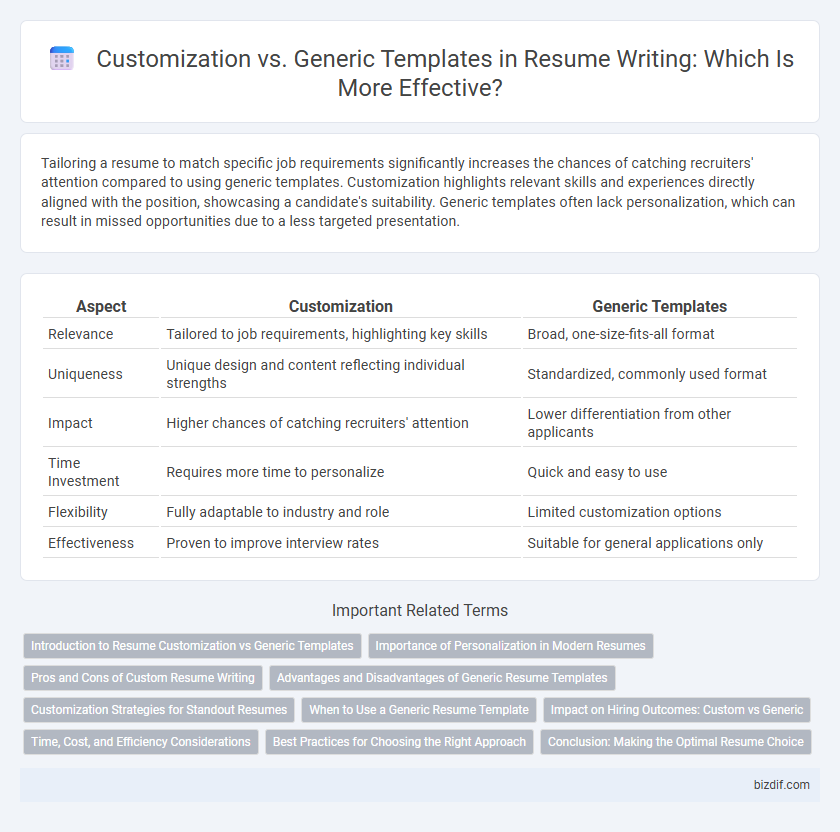Tailoring a resume to match specific job requirements significantly increases the chances of catching recruiters' attention compared to using generic templates. Customization highlights relevant skills and experiences directly aligned with the position, showcasing a candidate's suitability. Generic templates often lack personalization, which can result in missed opportunities due to a less targeted presentation.
Table of Comparison
| Aspect | Customization | Generic Templates |
|---|---|---|
| Relevance | Tailored to job requirements, highlighting key skills | Broad, one-size-fits-all format |
| Uniqueness | Unique design and content reflecting individual strengths | Standardized, commonly used format |
| Impact | Higher chances of catching recruiters' attention | Lower differentiation from other applicants |
| Time Investment | Requires more time to personalize | Quick and easy to use |
| Flexibility | Fully adaptable to industry and role | Limited customization options |
| Effectiveness | Proven to improve interview rates | Suitable for general applications only |
Introduction to Resume Customization vs Generic Templates
Resume customization involves tailoring content to match specific job descriptions, highlighting relevant skills and experiences that increase the likelihood of passing Applicant Tracking Systems (ATS). Generic templates offer a one-size-fits-all format that may lack targeted keywords and fail to address unique job requirements, reducing competitive advantage. Optimizing a resume through customization enhances personal branding and improves recruiter engagement by emphasizing role-specific qualifications.
Importance of Personalization in Modern Resumes
Personalization in resume writing significantly increases the chances of passing Applicant Tracking Systems (ATS) by incorporating relevant keywords tailored to specific job descriptions. Custom resumes highlight unique skills and achievements, making candidates stand out to recruiters compared to generic templates that often lack specificity. Modern hiring practices prioritize tailored applications, emphasizing the importance of customization to align with employer expectations and industry standards.
Pros and Cons of Custom Resume Writing
Custom resume writing offers personalized content tailored to specific job roles, showcasing relevant skills and achievements that increase the chances of passing Applicant Tracking Systems (ATS). However, it often requires more time and higher costs compared to generic templates, which may result in inconsistent formatting or lack of targeted keywords. Custom resumes can significantly enhance candidate visibility and employer appeal when properly crafted to reflect industry-specific requirements.
Advantages and Disadvantages of Generic Resume Templates
Generic resume templates offer time-saving convenience and a structured format that ensures all essential sections are included, making them ideal for quick applications. However, these templates often lack personalization, which can result in a resume that fails to highlight unique skills, experiences, or the specific requirements of a job posting. This impersonal approach risks blending candidates into a crowded applicant pool without effectively showcasing their individual strengths or alignment with the employer's needs.
Customization Strategies for Standout Resumes
Effective customization strategies for standout resumes involve tailoring content to match specific job descriptions by incorporating relevant keywords and quantifiable achievements, which improves applicant tracking system (ATS) compatibility. Highlighting industry-specific skills and aligning personal branding with the company's values enhances the resume's impact on hiring managers. Emphasizing unique experiences and measurable results creates a distinctive profile that generic templates fail to deliver, increasing the likelihood of securing interviews.
When to Use a Generic Resume Template
Generic resume templates are most effective when applying to multiple entry-level positions or large companies using automated Applicant Tracking Systems (ATS), as they ensure keyword consistency and easy scanning. They serve well in industries with standardized role requirements, such as retail or customer service, where customization may be less critical. Using a generic template speeds up the application process and maintains a clean, professional format suited for high-volume job applications.
Impact on Hiring Outcomes: Custom vs Generic
Tailoring resumes to specific job descriptions significantly improves applicant tracking system (ATS) compatibility and increases recruiter engagement by highlighting relevant skills and achievements. Generic templates often dilute critical keywords and result in lower interview callback rates, as they fail to address unique employer requirements. Data shows customized resumes can boost interview invitations by up to 50% compared to generic formats, underscoring the importance of personalization in hiring success.
Time, Cost, and Efficiency Considerations
Customizing a resume takes more time and effort but increases the chances of landing an interview by tailoring content to specific job requirements. Generic templates save time and reduce initial costs but often sacrifice alignment with employer expectations, decreasing overall effectiveness. Balancing time investment with targeted customization improves efficiency in job application outcomes and maximizes return on effort.
Best Practices for Choosing the Right Approach
Selecting between customized resumes and generic templates hinges on the specific job target and industry standards; customized resumes yield higher engagement by tailoring skills and experience to the role, enhancing applicant tracking system (ATS) compatibility. Best practices recommend analyzing job descriptions to incorporate relevant keywords and quantifiable achievements while maintaining clarity and professionalism. Leveraging tailored content increases the likelihood of passing ATS filters and impressing recruiters, whereas generic templates might streamline the application process but often lack specificity and impact.
Conclusion: Making the Optimal Resume Choice
Choosing a tailored resume over a generic template significantly enhances applicant tracking system (ATS) compatibility and highlights relevant skills for targeted job roles. Customized resumes increase interview call-back rates by up to 50%, demonstrating their impact on job search success. Prioritizing specificity and alignment with job descriptions ensures a competitive edge in the hiring process.
Customization vs Generic Templates Infographic

 bizdif.com
bizdif.com